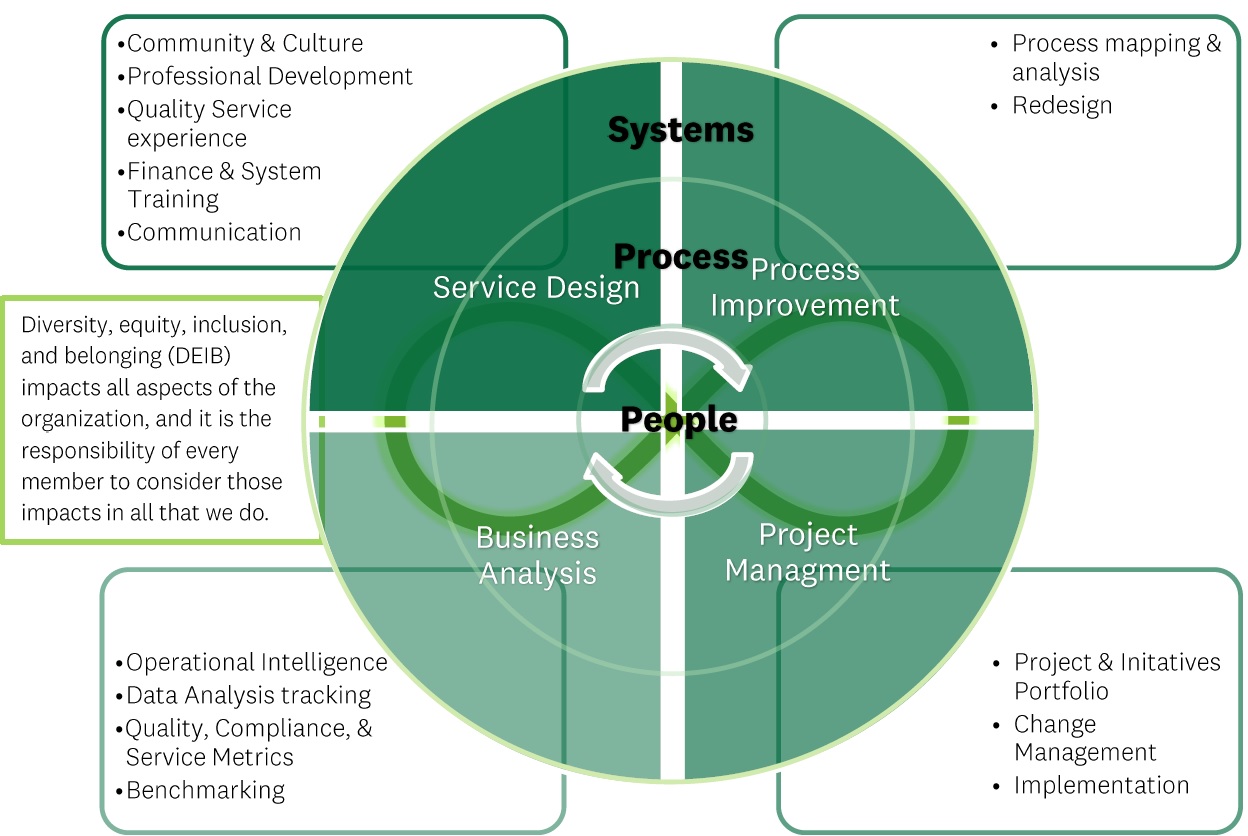Finance DEIB Action Plan
In Finance, our people are our strength. By reinforcing and further integrating our core principles, and committing to continuous development of our people, processes, and systems, we aim to achieve the following outcomes:
- More empowered and engaged staff.
- Enhanced customer satisfaction levels.
- Improved retention rates of top talent and increased opportunities to recruit a
more diverse staff.
- Reduced inefficiencies resulting from disengaged staff and defective processes,
services, and systems.
Our Purpose
Dartmouth Finance is dedicated to upholding a culture that prioritizes excellence, service, continuous improvement, and communication. This initiative leverages these positive attributes and foster a commitment to our core principles by all members of the Finance team. These principles are centered on a strong dedication to understand and incorporate vital elements of diversity, equity, inclusion, and belonging in order to improve the experience for our staff as well as the services and processes we offer.
Building on our Strengths
The objective of this initiative is to foster support and empowerment for our staff within Finance and across the institution. We aim to achieve this through individual growth, professional development, and self-awareness, which will strengthen our emotional intelligence and organizational effectiveness. By leveraging our cultural strengths, we can deepen our understanding and better integrate our core principles. These collective endeavors will facilitate our ongoing progress of purposefully integrating a mindfulness toward diversity, equity, inclusion, and belonging.
Finance Organizational Effectiveness

Key Strengths
In Finance, our people are our strength. By reinforcing and further integrating our core principles, and committing to continuous development of our people, processes, and systems, we aim to achieve the following outcomes:
- More empowered and engaged staff.
- Enhanced customer satisfaction levels.
- Improved retention rates of top talent and increased opportunities to recruit a more diverse staff.
- Reduced inefficiencies resulting from disengaged staff and defective processes, services, and systems.
Benefits to the Organization
Finance DEIB Action Plan Goals
Organization Goals
- Continuous improvement of systems, processes, and customer service.
- Develop our workforce to support evolving needs and requirements.
- Reinforce and strengthen our commitment to Diversity, Equity, and Inclusion.
- Enable planning and decision making through excellence in reporting and analytics.
- Encourage collaboration and support across Dartmouth.
- Ensure appropriate compliance.
- Identify and model best practice for campus.
DEIB Long-Term Goals
- Improve staff engagement and satisfaction through inclusion and empowerment efforts.
- Improve community satisfaction and engagement through inclusion and staff understanding and service.
- Attract and retain diverse workforce for improved operational efficiency, and effective decision making and service.
- Individual and team performance linked to organizational goals.
DEIB 2023 Goals
- Develop Finance DEIB goals consistent with Dartmouth’s DEIB strategic plan.
- Offer opportunities for continued learning and engagement with diversity, equity, inclusion, and belonging initiatives, developing awareness and understanding of diversity, racial and social justice, and inclusiveness.
- Expand and reinforce our commitment to increasing the diversity of our community and networks by ensuring inclusive policies, practices, attitudes, and actions (e.g., supplier diversity, using DEIB as a factor in vendor evaluations for Finance-procured services).
Action Steps
Complete
- Form DEIB Steering Committee - Demetra Chase, Cleston Murray, Hector Rivera, Cameron Stevens, and Lisa Wallace
- Draft and present DEIB Action Plan to Finance Leadership
- Present DEIB Action Plan to EVP and IDE
- Present DEIB Action Plan and Finance Engagement Discussions, Survey, and Culture Conversations
- Finance Engagement and Culture Conversation Outcomes Presented
In Progress
- DEIB Discussions and Professional Development (Continuation)
- Supplier Diversity Program (Winter)
- Procure-to-Pay Guide (Winter)
- DEI Tracking Project (Winter)
Pending
- Expanded Communication and Outreach (Fall)
- Finance Business Partner Evaluation (Winter)
- 2024 DEIB Action Plan
Terminology and Definitions
Institutional Key Terms from IDE Toward Equity
Diversity: includes attributes such as race, gender identity, age, ethnicity, ability, national origin, religion, sexual orientation, and socio-economic status, among other aspects of identity. The composite of the various backgrounds present in the Dartmouth community makes the campus diverse. Diversity coupled with equity, inclusion, and belonging allows for optimal creativity, innovation, and academic excellence.
Equity: is successfully creating structures and systems that disrupt existing and potential barriers to individual success and ensuring that we treat all persons fairly. Our progress toward equity, diversity, inclusion, and belonging addresses the historical legacies of exclusion, promotes social justice, and equips every member of our community to thrive.
Inclusion: is an active, intentional, and ongoing individual and organizational effort in which we treat people from different backgrounds or identities equitably, welcome them into our social and cultural circles, and include them in decision-making. The result of effective inclusion efforts is belonging.
Belonging: refers to a personal sense of feeling seen and valued for being our authentic selves. We experience and reinforce belonging through cultural messaging that each member of the community purposefully creates.
Finance DEIB Action Plan and Core Values Key Terms:
Agility: is the ability to move quickly and easily; think and understand quickly; nimbleness.
Culture: is the unspoken social order of an organization characterized by shared assumptions, beliefs, values, and expectations.
Continuous Improvement: is a constant, ongoing effort to improve (people, processes, services, systems).
Emotional Intelligence: is the ability to understand and manage one’s own emotions (self-awareness, self-management) and understand the emotions of others (social-awareness, relationship-management).
Organizational Effectiveness: is an organization’s self–awareness of, and the degree to which it can achieve, its goals.
Transparency: is the act of both good and bad information being shared upward, downward, and laterally in a way that allows all to see the why behind the words. The benefits of transparent communication are increased collaboration, enhanced trust, and increased innovation.
